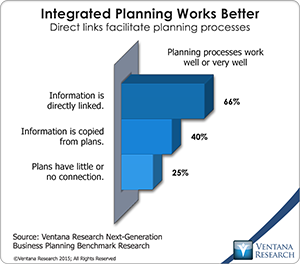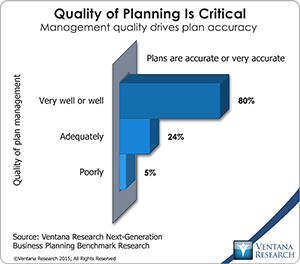Business planning includes all of the forward-looking activities in which companies routinely engage. Companies do a great deal of planning. They plan sales and determin e what and how they will produce products or deliver services. They plan the head count they’ll need and how to organize distribution and their supply chain. They also produce a budget, which is a financial plan. The purpose of planning is to be successful. Planning is defined as the process of creating a detailed formulation of a program of action to achieve some overall objective. But it’s more than that. The process of planning involves discussions about objectives and the resources and tactics that people need to achieve them. When it’s done right, planning is the best way to get everyone onto the same page to ensure that the company is well organized in executing strategy. Setting and to a greater degree changing the company’s course require coordination. Being well coordinated in this case means being able to understanding the impact of the policies and actions in your part of the company on the rest of the company.
e what and how they will produce products or deliver services. They plan the head count they’ll need and how to organize distribution and their supply chain. They also produce a budget, which is a financial plan. The purpose of planning is to be successful. Planning is defined as the process of creating a detailed formulation of a program of action to achieve some overall objective. But it’s more than that. The process of planning involves discussions about objectives and the resources and tactics that people need to achieve them. When it’s done right, planning is the best way to get everyone onto the same page to ensure that the company is well organized in executing strategy. Setting and to a greater degree changing the company’s course require coordination. Being well coordinated in this case means being able to understanding the impact of the policies and actions in your part of the company on the rest of the company.
Our recently completed research on next-generation business planning benchmarked 11 of the most common types of business planning (for example, demand, head count, strategic and supply chain). The research finds that planning activities typically are created in a stand-alone fashion by the departments primarily responsible for them and receive little or no direct input from other parts of the organization. The main exception is the budget, which is the only integrated business plan; most companies connect individual plans with the budget in some way. The research finds a correlation between how a company connects individual plans with the budget and how well the planning process works. Two-thirds of companies that have  direct links from individual plans to their budget said their planning processes work well or very well, compared to two in five that copy detailed information from individual plans into the budget and just one-fourth that have little or no connection between individual plans and the budget.
direct links from individual plans to their budget said their planning processes work well or very well, compared to two in five that copy detailed information from individual plans into the budget and just one-fourth that have little or no connection between individual plans and the budget.
Information technology has the potential to make business planning more useful, enabling it to improve a company’s performance and increase its competitiveness. Most companies can fundamentally change how they plan for the better, thanks to increasingly capable and easier-to-use information technology. Technology makes it possible for companies to take an integrated approach to business planning. In such an approach individual parts of the company continue to plan as they are used to doing, but they are also able to see what other parts of the company are planning, and they can determine what impact their plans will have on the rest of the organization. Questions they can answer include, does the marketing budget align with the individual sales plans? Will there be a sufficient number of people to make the plan work? Are there more people than necessary, too few of some or too many of others? It’s not that companies are completely incapable of doing this today – they just take too long to do it and don’t get enough of a return on the time they invest. They aren’t able to achieve the kind of accuracy they need. They aren’t able to adapt as business conditions change. Today, in a period of relative stability, it’s easy to forget that during the last downturn, most companies spent months producing plans that were obsolete right from the start.
Most companies can use business planning to improve their performance and competitiveness. To do so, it must achieve four main characteristics. First, business planning must focus on performance. In other words, it must establish a baseline against which results can be measured. Performance must be measured against both business and financial objectives – not just against budget. Second, it must help executives and managers quickly and intelligently assess all relevant contingencies and trade-offs to support their decisions. Third, it must enable each individual business planning group to work in one central system; this simplifies the integration of their plans into a single view of the company and makes it easy for planners in one part of the business to see what others are projecting. Fourth, it must be efficient in its use of people’s time. Let’s face it – success in business comes from doing, not just planning. Having a time-efficient planning process makes it possible to improve a company’s agility in responding to change, especially for larger organizations.
Contrast this with how companies plan today. As we said, the purpose of planning is to figure out how to succeed in achieving business objectives. Typically, today the only company-wide business plan is the budget. It should be an open-ended exercise that explores different paths to success. However, the budget’s main purpose is to prevent a company from failing. It’s about setting limits and ensuring those limits are enforced. Budgets are essential for financial management, for corporate governance and for control. But they much less useful for determining how to achieve objectives through a coordinated set of actions. Most budgeting and operational planning efforts are only loosely connected. In contrast next-generation business planning closely is designed to integrate unit-level operational plans with financial planning. At the corporate level, it shifts the emphasis from financial budgeting to planning and to performance reviews that integrate both operational and financial measures. It uses available information technology to help companies plan faster with less effort while achieving greater accuracy and agility. By using capable software and accurate, timely data, current systems can simultaneously support better business planning and traditional budgeting.
Today’s dedicated planning software is an important  element to more effective business planning. Our research demonstrates the connection between how well a company manages its planning processes and the accuracy of the resulting plans: 80 percent of those that manage their processes well or very well have plans that are accurate or very accurate. Only one-fourth (24%) of those that manage their processes just adequately said they get these kinds of results, and almost none (8%) of those that manage their processes poorly said their plans are accurate. Used properly, today’s applications support better management of the process. They provide a single environment in which individual functions or business units can create and revise plans to meet their requirements while making the plans available to the senior leadership team and the rest of the organization. Because they are working from a common database, it’s relatively easy to combine the most up-to-date data from individual contributors or to aggregate planning data from multiple sources.
element to more effective business planning. Our research demonstrates the connection between how well a company manages its planning processes and the accuracy of the resulting plans: 80 percent of those that manage their processes well or very well have plans that are accurate or very accurate. Only one-fourth (24%) of those that manage their processes just adequately said they get these kinds of results, and almost none (8%) of those that manage their processes poorly said their plans are accurate. Used properly, today’s applications support better management of the process. They provide a single environment in which individual functions or business units can create and revise plans to meet their requirements while making the plans available to the senior leadership team and the rest of the organization. Because they are working from a common database, it’s relatively easy to combine the most up-to-date data from individual contributors or to aggregate planning data from multiple sources.
What’s more, collaboration is essential to effective planning. Perspectives from people in different roles or departments can help produce more complete plans and identify risks and opportunities. Here again many organizations fall short: Only half collaborate effectively or very effectively. And this, too, impacts the process: 85 percent of organizations that collaborate effectively or very effectively said they manage the planning process well or very well. Along similar lines, nearly half (47%) of participants reported that they have only a general idea of the impact of their department’s plan on the rest of the company. Most dedicated applications have built-in capabilities. Vendors increasingly are improving the ability of individuals to collaborate in context as a way to differentiate their offerings.
The findings of this benchmark research lead us to conclude that all but a few companies would benefit significantly from investing in improving the various aspects of planning, particularly technology. Applications dedicated to planning and next-generation tools such as analytics, collaboration and mobility can contribute to the development of fast, forward-looking plans that help in the spectrum of planning processes and benefit the entire organization.
Regards,
Robert Kugel
SVP & Research Director

 e what and how they will produce products or deliver services. They plan the head count they’ll need and how to organize distribution and their supply chain. They also produce a budget, which is a financial plan. The purpose of planning is to be successful. Planning is defined as the process of creating a detailed formulation of a program of action to achieve some overall objective. But it’s more than that. The process of planning involves discussions about objectives and the resources and tactics that people need to achieve them. When it’s done right, planning is the best way to get everyone onto the same page to ensure that the company is well organized in executing strategy. Setting and to a greater degree changing the company’s course require coordination. Being well coordinated in this case means being able to understanding the impact of the policies and actions in your part of the company on the rest of the company.
e what and how they will produce products or deliver services. They plan the head count they’ll need and how to organize distribution and their supply chain. They also produce a budget, which is a financial plan. The purpose of planning is to be successful. Planning is defined as the process of creating a detailed formulation of a program of action to achieve some overall objective. But it’s more than that. The process of planning involves discussions about objectives and the resources and tactics that people need to achieve them. When it’s done right, planning is the best way to get everyone onto the same page to ensure that the company is well organized in executing strategy. Setting and to a greater degree changing the company’s course require coordination. Being well coordinated in this case means being able to understanding the impact of the policies and actions in your part of the company on the rest of the company.










